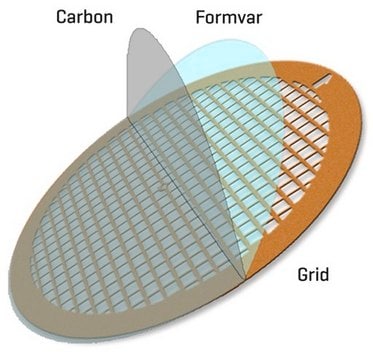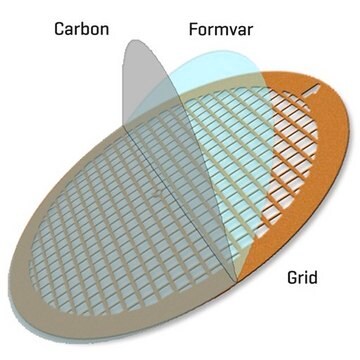G4901
Grids for transmission electron microscopy
grid size 300 mesh × 83 μm pitch, copper
Sign Into View Organizational & Contract Pricing
All Photos(2)
About This Item
UNSPSC Code:
41100000
NACRES:
MA.01
Recommended Products
material
copper
description
Regular grids with center mark and solid border
packaging
vial of 100 grids
diam.
3.05 mm
grid size
300 mesh × 83 μm pitch
hole W
63 μm
open area size
55%
Looking for similar products? Visit Product Comparison Guide
Application
Grids for transmission electron microscopy have been used for mounting thin sections of tissues:
- to analyze the damaged mitochondria and autophagy in human neuroblastoma cell line
- in the histological evaluation of rat tissue samples
- for morphological analysis of mice myoblast cell line
Certificates of Analysis (COA)
Search for Certificates of Analysis (COA) by entering the products Lot/Batch Number. Lot and Batch Numbers can be found on a product’s label following the words ‘Lot’ or ‘Batch’.
Already Own This Product?
Find documentation for the products that you have recently purchased in the Document Library.
Customers Also Viewed
İsmail Seçkin et al.
Romanian journal of morphology and embryology = Revue roumaine de morphologie et embryologie, 58(3), 823-830 (2017-12-19)
Puromycin aminonucleoside (PA) has been generally utilized as model of podocyte injury followed by massive proteinuria, severe damage on endocytotic activity of epithelial cells and postmodification of endocytosed compounds. However, total PA nephrosis (PAN) mechanism cannot be understood. We aimed
Ismail Seckin et al.
Journal of biomedical science, 19, 24-24 (2012-02-18)
In experimentally induced puromycine aminonucleoside nephrosis (PAN) animal models, nephrotic syndrome with minimal change disease and focal and segmental sclerosis-like nephritis similar to that in human is demonstrated; however, the real mechanism of PAN is not yet elucidated. Platelet derived
T Martinovic et al.
Tissue & cell, 52, 92-100 (2018-06-03)
Type 2 diabetes is an endocrine disorder characterized with hyperglycemia, hyperinsulinemia and insulin resistance. Morphological changes in cell nuclei in diabetes were recently detected. The aim of this study was to compare electron microscopic features of lymphocyte nuclei in type
Shijun Yu et al.
Hepatology research : the official journal of the Japan Society of Hepatology, 49(11), 1329-1340 (2019-06-27)
B-cell lymphoma-2-associated transcription factor 1 (BCLAF1) is involved in various biological processes including tumorigenesis, but its function and expression in hepatocellular carcinoma (HCC) is little known, and its clinical value in HCC has not yet been defined. The protein level
Salime Pelin Ertürküner et al.
Pharmacological reports : PR, 66(2), 279-287 (2014-06-10)
Hyperglycemia and advanced glucose end substance (AGE) are responsible for excessive reactive oxygen species (ROS) production, which causes oxidative stress in diabetes mellitus. Oxidative stress and high blood pressure may cause injury and glomerulosclerosis in the kidney. End-stage kidney failure
Our team of scientists has experience in all areas of research including Life Science, Material Science, Chemical Synthesis, Chromatography, Analytical and many others.
Contact Technical Service




